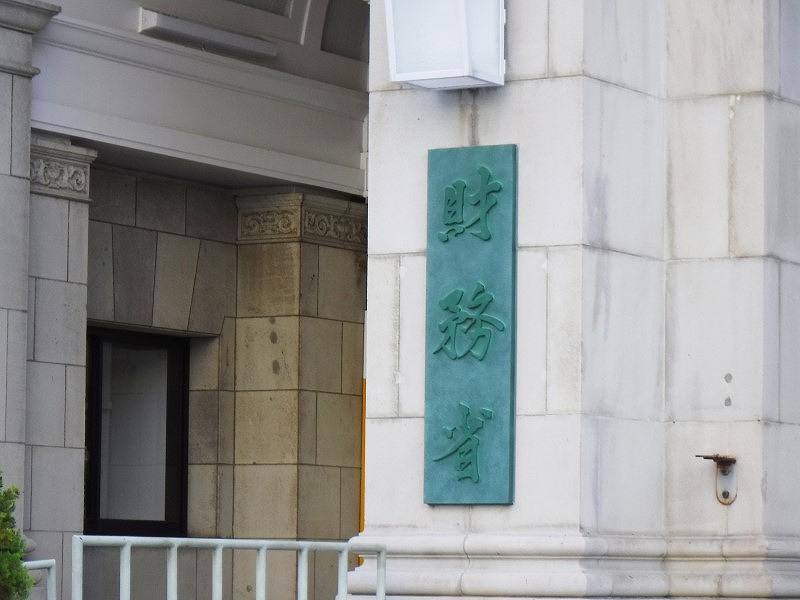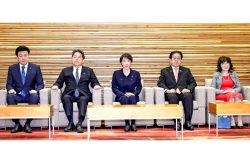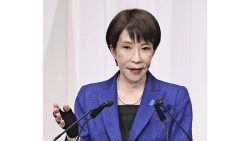
The Finance Ministry’s headquarters building in Tokyo.
15:40 JST, December 16, 2020
The time has come for the government to think calmly about how to bring an extraordinary budget, crafted amid the extraordinary time of the coronavirus pandemic, back to a normal state.
For creating additional economic stimulus measures, the tide changed in late November when the Cabinet Office released estimates.
According to the estimates, the nation’s economy had a shortfall in demand of ¥34 trillion because of a downturn in the July-September quarter. These estimates prompted the ruling camp to call for the government to compile another major supplementary budget to fill this gap.
It is easier for lawmakers to gain public support if they help increase budget expenditures than reduce them. This sounds even more true for lawmakers who are thinking about the House of Representatives election due next year.
The Finance Ministry was reluctant for an additional drastic increase in budget expenditures, saying the government had already taken enough measures to address the demand shortfall through two supplementary budgets for fiscal 2020. However, this notion was not heeded.
In the end, the additional economic package has been decided in which fiscal spending by the central and local governments totals ¥40 trillion, higher than the ¥34 trillion initially discussed.
However, it is difficult to accurately measure a demand shortfall. The Cabinet Office and the Bank of Japan have released estimates on this issue, which show huge differences from each other. Perhaps lawmakers and officials did not account for this aspect in discussing the additional economic package.
Moreover, the ¥40 trillion of fiscal spending includes ¥5 trillion in the remainder of reserve funds for the current fiscal year, which ends in March, as well as another ¥5 trillion in reserve funds that will be earmarked in an initial budget bill for fiscal 2021. This means that fiscal spending is ballooning through reserve funds whose spending purposes have not been decided.
It is understandable that the additional economic package focuses on strengthening medical services and helping to maintain employment.
On the other hand, it also includes projects to encourage decarbonization and digitization, with related spending having been earmarked in a bill for a third supplementary budget for fiscal 2020.
These policies are favorable on their own, but spending for lesser urgent projects should have been included in the initial budget for the next fiscal year so that the Diet can have careful discussions on these issues. Rigorous scrutiny is essential to ensure that there is no spending in the heat of the moment.
By compiling three supplementary budgets, it is expected that the general account spending for the current fiscal year will swell to ¥175 trillion, with the issuance of government bonds to reach an unprecedented ¥112 trillion, a record high for a fiscal year. This massive debt will be passed down to the younger generations.
Since the BOJ has been buying a large amount of government bonds, their prices won’t fall with interest rates remaining at almost zero, no matter how many have been issued. Consequently, fiscal discipline tends to be lacking. The government and the ruling camp should be aware of these risks.
Top Articles in Politics
-

LDP Wins Historic Landslide Victory
-

LDP Wins Landslide Victory, Secures Single-party Majority; Ruling Coalition with JIP Poised to Secure Over 300 seats (UPDATE 1)
-

Japan Tourism Agency Calls for Strengthening Measures Against Overtourism
-

CRA Leadership Election Will Center on Party Rebuilding; Lower House Defeat Leaves Divisions among Former CDPJ, Komeito Members
-

Voters Using AI to Choose Candidates in Japan’s Upcoming General Election; ChatGPT, Other AI Services Found Providing Incorrect Information
JN ACCESS RANKING
-

Japan Institute to Use Domestic Commercial Optical Lattice Clock to Set Japan Standard Time
-

Israeli Ambassador to Japan Speaks about Japan’s Role in the Reconstruction of Gaza
-

Man Infected with Measles May Have Come in Contact with Many People in Tokyo, Went to Store, Restaurant Around When Symptoms Emerged
-

China Eyes Rare Earth Foothold in Malaysia to Maintain Dominance, Counter Japan, U.S.
-

Prudential Life Insurance Plans to Fully Compensate for Damages Caused by Fraudulent Actions Without Waiting for Third-Party Committee Review























